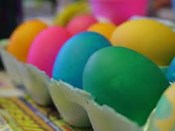There are some important safe handling methods to remember this time of year when you’re decorating, cooking or hiding Easter eggs since eggs are handled a great deal more than usual around Easter. Remember to:
- Wash your hands thoroughly with hot soapy water and rinse them before handling the eggs when cooking, cooling, dyeing and hiding them.
- Be sure and inspect the eggs before purchasing them, making sure they are not dirty or cracked. Dangerous bacteria may enter a cracked egg.
- Store eggs in their original cartons in the refrigerator rather than the refrigerator door.
- If you’re having an Easter egg hunt, consider hiding places carefully. Avoid areas where the eggs might come into contact with pets, wild animals, birds, reptiles, insects or lawn chemicals.
- Make sure you find all the eggs you’ve hidden and then refrigerate them. Discard cracked eggs.
- As long as the eggs are NOT out of refrigeration over two hours, they will be safe to eat. Do not eat eggs that have been out of refrigeration more than two hours. Refrigerate hard-cooked eggs in their shells and use them within 1 week. If you are planning to use colored eggs as decorations, (for centerpieces, etc.) where the eggs will be out of refrigeration for many hours or several days, discard them after they have served their decorative purpose.
Find out how to cook the perfect hard boiled egg and egg recipes here.







